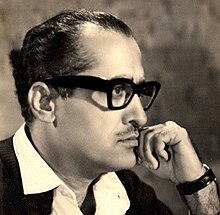|
Nasir Hussain
Mohammad Nasir Hussain Khan (16 November 1926 – 13 March 2002), better known as Nasir Hussain, was an Indian film producer, film director, and screenwriter.[4] With a career spanning decades, Hussain has been credited as a major trendsetter in the history of Hindi cinema. For example, he directed Yaadon Ki Baraat (1973), which created the Hindi language masala film genre that defined Hindi cinema in the 1970s and 1980s,[5] and he wrote and produced Qayamat Se Qayamat Tak (1988), which set the Hindi language musical romance template that defined Hindi cinema in the 1990s.[6][7] Akshay Manwani wrote a book on Hussain's cinema titled Music, Masti, Modernity: The Cinema of Nasir Husain.[8] Early lifeHussain was born in Bhopal State on 16 November 1926 to Jaffar Hussain Khan, a schoolteacher who belonged to a zamindar family of Pashtun descent, and Aamna, who traced her Arab roots to Jeddah (modern-day Saudi Arabia) and was the niece of Maulana Azad, and he was the fourth of five children, the youngest being Tahir Hussain, the father of Aamir Khan.[9] Personal lifeHe married Ayesha Khan, who pre-deceased him.[10] Their son Mansoor Khan is a former film director and producer whose daughter is actress Zayn Marie Khan.[11] The couple are the maternal grandparents of Imran Khan, a former film actor. CareerEarly careerHussain first worked with Qamar Jalalabadi when he joined Filmistan as a writer in 1948. The famous films he wrote for Filmistan include Anarkali (1953), Munimji (1955), and Paying Guest (1957). Filmistan was the breakaway studio from Bombay Talkies; it used mid-budget formula productions and sold on star value and music. Sashadhar Mukherjee was a part of the breakaway team, and he gave Hussain Tumsa Nahin Dekha to direct. The film made a star of Shammi Kapoor. Kapoor and Hussain made another hit, Dil Deke Dekho (1959), for Filmalaya, the breakaway group of Filmistan. The film introduced Asha Parekh, who would be the lead in all of Hussain's films until Caravan (1971). He was also in a long romantic relationship with her, but it ended because he was already a married man with two children, and Parekh didn't want to be labeled a homewrecker.[12] Hussain's wife was Margaret Francina Lewis, an assistant choreographer he met at Filmistan. They married and then she changed her name to Ayesha Khan. She worked as an assistant choreographer on some of his productions.[8] Own productionHussain then set up Nasir Hussain Films and turned producer-director. He made musical hits like Jab Pyar Kisi Se Hota Hai (1961), Phir Wohi Dil Laya Hoon (1963), Teesri Manzil (1966), Baharon Ke Sapne (1967), Pyar Ka Mausam (1969), Caravan (1971), Yaadon Ki Baraat (1973), and Hum Kisise Kum Naheen (1977). Hussain, Majrooh Sultanpuri, and R.D. Burman collaborated on Teesri Manzil, Baharon Ke Sapne, Pyar Ka Mausam, Caravan, Yaadon Ki Baraat and Hum Kisise Kum Naheen. Hussain wrote and produced the musical cult hit Teesri Manzil. Vijay Anand directed the film, which starred Hussain's regular actors Shammi Kapoor and Asha Parekh. Originally Dev Anand was signed for the film but due to differences with Hussain he opted out and Kapoor was cast.[13] He also hired R.D. Burman for the first time to compose the songs ("O Haseena Zulfonwali", "O Mere Sona Re", "Deewaana Mujhsa Nahin", "Tumne Mujhe Dekha", "Aaja Aaja Main Hoon Pyaar Tera"). After the songs became evergreen hits, Burman would compose for all of Hussain's films for the next 19 years, ending with Zabardast (1985). Hussain's Yaadon Ki Baraat was written by Salim–Javed, who had written Zanjeer the same year. Both films dealt with the hero wanting to avenge his father's death, and both featured Ajit as the villain. Yaadon Ki Baraat has been identified as the first masala film.[14][15] Late careerAs Zamane Ko Dikhana Hai (1981), Manzil Manzil (1984) and Zabardast (1985) all flopped, Hussain's son Mansoor took over the reins of Nasir Hussain Films, although Hussain continued to write scripts and dialogues for films like Qayamat Se Qayamat Tak (1988) and Jo Jeeta Wohi Sikander (1992). In Qayamat Se Qayamat Tak, he introduced his nephew Aamir Khan as a hero. Qayamat Se Qayamat Tak was a milestone in the history of Hindi cinema, setting the template for Hindi language musical romance films that defined Hindi cinema in the 1990s.[6][7] Hussain received a special Filmfare Award in 1996 for his contribution to Hindi cinema. DeathHussain died in Mumbai on 13 March 2002 following a heart attack.[16] After his death, Asha Parekh stated in an interview that she had not seen him the last year of his life, as he became reclusive because of his wife's death.[17] AssociationsHussain had several "favourites" with whom he worked repeatedly.
Awards and nominations
Filmography
References
External links |
||||||||||||||||||||||||||||||||||||||||||||||||||||||||||||||||||||||||||||||||||||||||||||||||||||||||||||||||||||
